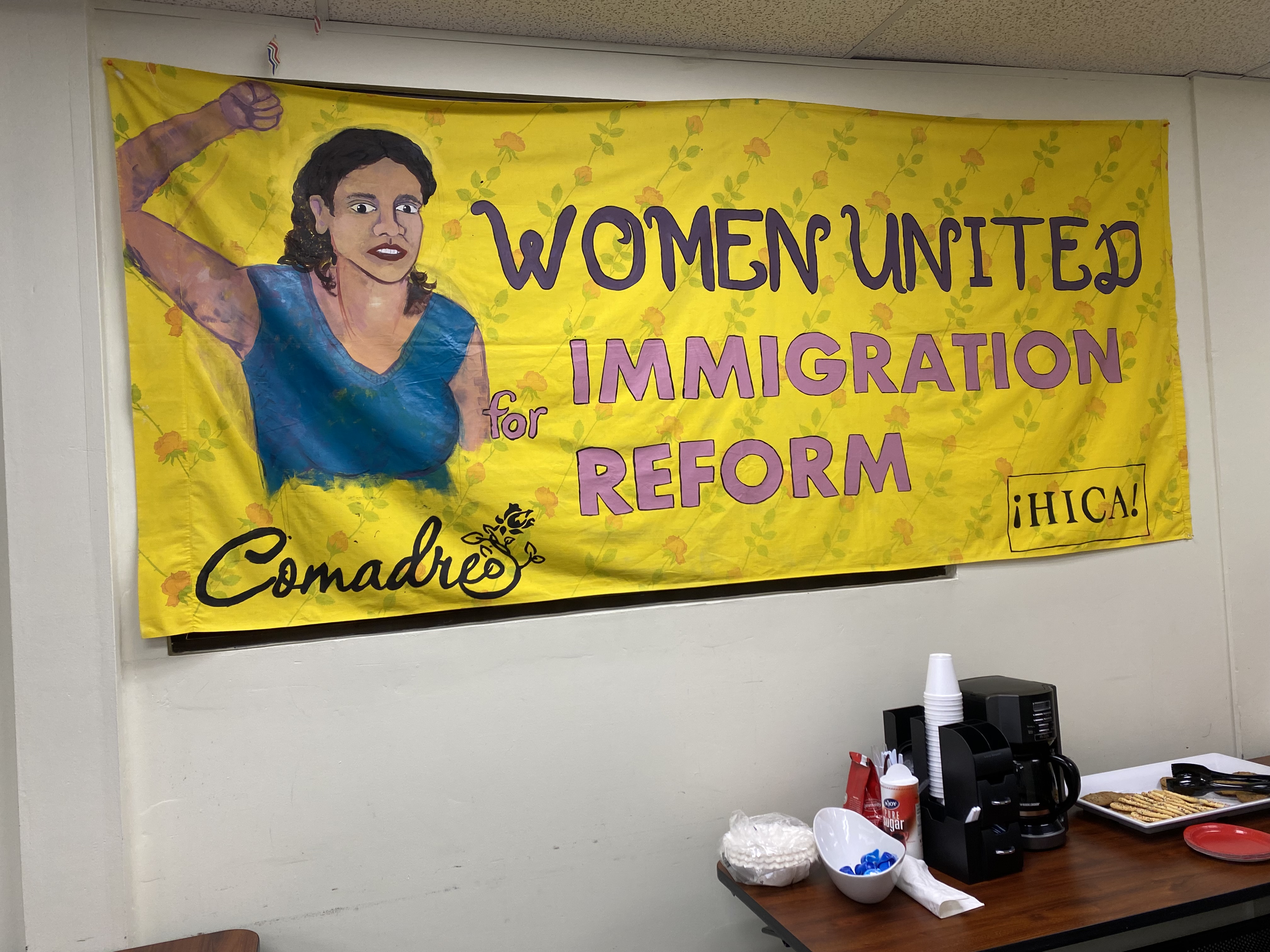By Leah Nelson, Research Director from the Appleseed report Afterward

On a rainy Thursday in early March, Alabama Appleseed sat down in the offices of the Hispanic Interest Coalition of Alabama (¡HICA!) with 11 women who were victims of violent crime. Over tacos, we asked them to take our survey and invited them to talk with us about their experiences with violence and its aftermath.
All the women spoke Spanish more fluently than they spoke English, so we provided a Spanish-language version of the survey (translated by ¡HICA!) and facilitated the conversation in Spanish. A bilingual interpreter took contemporaneous notes translating participants’ comments into English, and the author of this report debriefed afterwards with the Spanish-speaking facilitator to ensure that as little was lost in translation as possible.
To fill in knowledge gaps and develop an understanding of trends, Appleseed also spoke with several members of ¡HICA!’s Strong Families Program, who provide support to Hispanic Alabama residents who have experienced violent victimization.
The Spanish-language version of our survey was almost identical in content to the English-language version, but after consulting with the experts at ¡HICA!, we determined it did not make sense to merge the results of the two surveys or rely on the Spanish-language survey to meaningfully document what participants have lived through. Although the words were translated accurately, the Spanish speakers who took our survey have significant experiences that the survey was not designed to capture. For instance, for undocumented immigrants, any contact with the criminal legal system can trigger deportation, but the section of our survey designed to document the experiences of people who are justice-involved does not get at that reality. Nor was our survey designed to account for the fact that many of ¡HICA!’s clients undertook dangerous journeys to flee violence and broken justice systems in the countries where they spent their youths. They live with trauma related to those experiences.
¡HICA!’s Strong Families clients often have that trauma compounded in the United States – first through violent victimization, then by the systems putatively in place to respond to it. Victim’s advocates at ¡HICA! said their constituents are vulnerable to predation and violence because of language barriers, immigration status, and bigotry. Many are afraid to call the authorities out of fear that contact with the law could trigger deportation proceedings, or because they or people they know have been treated callously in the past by law enforcement officials who make no secret of the fact that they consider Hispanic immigrants undeserving of equal protection.
¡HICA! stressed that law enforcement practices vary around the state and observed that some jurisdictions are doing better than others to meet the needs of the immigrant and Spanish-speaking communities they serve. Prosecutors in the Birmingham and Bessemer divisions of Jefferson County, and police and Department of Human Resources staff in Shelby County, have done substantial work to become more inclusive and culturally competent, ¡HICA! said.
But challenges remain, especially in rural areas. Many law enforcement agencies have no protocol for securing interpreters. Officers frequently use young children as interpreters. In one instance, the English-speaking husband of a Spanish-speaking woman who had been attacked and raped was made to describe her injuries to police in detail, which worsened the trauma and horror of the rape.
Some officers refuse to take reports because of language barriers. In an incident that disappointed ¡HICA!, a mother of six called police after her partner strangled her twice in a single day. Two deputies showed up, but they refused to take a police report because the woman, for whom English is a second language, used the word “argument” to describe the incident instead of the word “fight.” The woman fled her home with her children and still has not returned because she fears for their lives.
¡HICA! made sure the woman’s injuries were documented, and eventually police opened a case. But their refusal to take a report on the spot because of language issues undermined their credibility with both the victim and community members who heard about what happened. “In our community, when someone has a bad experience, everyone will know about it,” said Angelica Melendez, who leads ¡HICA!’s victim advocacy work.
Contact with the system can even backfire, Melendez said. ¡HICA! once told a woman whose intimate partner violated a Protection from Abuse order (PFA) to go to the police station to file a report. While she was there, officers asked her for identification. She didn’t have any. When she drove out of the police station, an officer followed her. “Pulled her over. Took her car. Left her in the middle of the road with her child,” said Melendez.
¡HICA! paid to get the car out of impoundment, but the whole incident undermined their work with that specific victim – and beyond. “How in the world, if somebody goes to file a police report because a PFA was violated and she was in danger, how are you more worried about the fact that the person didn’t show you an ID than the safety of the person?” Melendez said. “When things like that happen, people don’t even trust us.”
Below, we share stories from victims who spoke up during our community conversation. This documentation would not have been possible without the work of Facilitator Catherine Alexander-Wright, Interpreter/Notetaker Giovanna Hernandez-Martinez, and ¡HICA! Strong Families advocates including Angelica Melendez, Adriana Alderete, and Ana Ockert.
“They are hunting us.”
In 2022, a spate of robberies targeting families and workers at construction sites rocked Jefferson County’s Hispanic community. More than 40 Hispanic residents of Jefferson County were robbed in October alone, including six people in five separate incidents on a single day.
¡HICA! explained that many of the people they serve do not have bank accounts and keep their money in cash because of their immigration status and lack of ID. A woman who joined our community conversation expanded on that: “We feel more vulnerable as Hispanics, because they know that we’re scared to call the police. They are hunting us because they know that a lot of Hispanics working in construction, they cash their checks at the gas station, and we carry a lot of cash. We are easy for them to target.”
The Birmingham Police Department includes some Spanish-speaking officers who encouraged victims to report these incidents, and police have charged several suspects. But a woman who called police after her husband and father-in-law were held at gunpoint and lost their IDs, wallets, phones, cash, and equipment on one of these incidents told our community conversation that the officers who arrived on the scene were shockingly insensitive to the trauma her family had just experience.
They “just kind of laughed and said ‘Oh, we got four more [victims],’” she said. “Like it was funny.”
“Only because I cannot speak English, I cannot explain things.”
One of the women in the conversation recounted a chilling experience in Chilton County, a largely rural central Alabama county where 8.1% of residents identify as Hispanic or Latino – a rate higher than the overall Alabama rate of 4.8%.
The woman, C, lives in Chilton County with her partner and her children. C’s partner is physically abusive, and one day in early 2023 C’s daughter called 911 because the partner was strangling C.
C’s partner was still restraining C when police showed up, but he also had marks on him from where C had fought back to save her own life.
The partner speaks English; C does not. He leveraged the language barrier to his advantage, making a police report against C before she had a chance to get an interpreter who could help her. Even though a recording from the 911 call makes it clear that C’s partner was strangling her, the fact that he was able to make a police report first has put her in a disadvantaged and dangerous position. Chilton County law enforcement put C in jail and filed charges against her. She bonded out, but her status as a defendant became an obstacle to securing safety.
Police refused ¡HICA!’s efforts to help C file a Protection From Abuse (PFA) order, saying that because she was the defendant in the case and had not filed a police report (which was impossible due to the lack of an interpreter), she was ineligible for their help. After she was arrested, the children’s father took custody of them. She has not been able to get them back. She is afraid to return home, and police told her they would not help.
C wept as she shared her frustration, fear, and grief. “To the sheriff, I am the aggressor. Only because I cannot speak English, I cannot explain things,” she said. “To this day, I cannot get my kids back, because I am labeled the ‘aggressor.’”
Aftermath of a murder
One of the women who joined our group had recently lost her son to homicide. Although her home address was on her son’s driver’s license (which police had in their custody), police didn’t come to notify her that he was dead. Instead, she learned about his murder from social media and confirmed it with a funeral home.
Her son was a U.S. citizen and left behind a child. The child’s grandmother is his next of kin, but because she is undocumented, she is not eligible for victim’s compensation or other funding she could use to help her grandchild. But because the woman’s son was not married to the child’s mother, there is no legal connection between them, so the mother of the child is not entitled to compensation either.
The murdered man’s grieving mother is working on getting documents that will allow her to become a citizen. All she wants, she said, is to get compensation so she can provide for the grandchild whose dead father no longer can.





Leave a Reply
Want to join the discussion?Feel free to contribute!